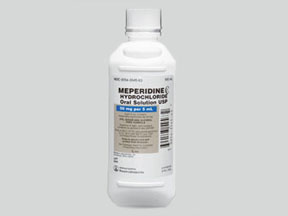
Meperidine Coupons & Savings Card – Discount Prices from $79.85
Generic for: Demerol
Meperidine is used to help relieve moderate to severe pain. It may also be used before and during surgery or other procedures. Meperidine belongs to a class of drugs known as opioid analgesics and is similar to morphine. It works in the brain to change how your body feels and responds to pain. Meperidine should not be used to treat long-term or ongoing pain. It should only be used to treat sudden episodes of moderate to severe pain. . This drug is not recommended for use in newborns due to an increased risk of serious side effects. Ask the doctor or pharmacist for details.
Our coupons are free to use. Before paying, show the pharmacist your Meperidine savings card to get your free discount. Use our filters below to edit the prescription box to match your needs. The Meperidine prices will update based on your prescription needs. Above our Meperidine coupons, you can change your location to see pharmacy prices and costs in other areas. We're here to help you buy Meperidine at the lowest price with our prescription discount card.
My prescription
Edit
500ML of 50MG/5ML, Meperidine (1 Bottle)
Select pharmacy

CVS
$79.85
COUPON PRICE
Walgreens
$92.40
COUPON PRICE
Albertsons
$92.49
COUPON PRICE
Walmart
$145.79
COUPON PRICEMeperidine savings card
Show this card to your pharmacist
CVS
$79.85
BIN
ID
PCN
GRP
015995
LHKPU682611
GDC
DR33
Powered by
Meperidine is used to help relieve moderate to severe pain. It may also be used before and during surgery or other procedures. Meperidine belongs to a class of drugs known as opioid analgesics and is similar to morphine. It works in the brain to change how your body feels and responds to pain. Meperidine should not be used to treat long-term or ongoing pain. It should only be used to treat sudden episodes of moderate to severe pain. . This drug is not recommended for use in newborns due to an increased risk of serious side effects. Ask the doctor or pharmacist for details.
Our coupons are free to use. Before paying, show the pharmacist your Meperidine savings card to get your free discount. Use our filters below to edit the prescription box to match your needs. The Meperidine prices will update based on your prescription needs. Above our Meperidine coupons, you can change your location to see pharmacy prices and costs in other areas. We're here to help you buy Meperidine at the lowest price with our prescription discount card.
